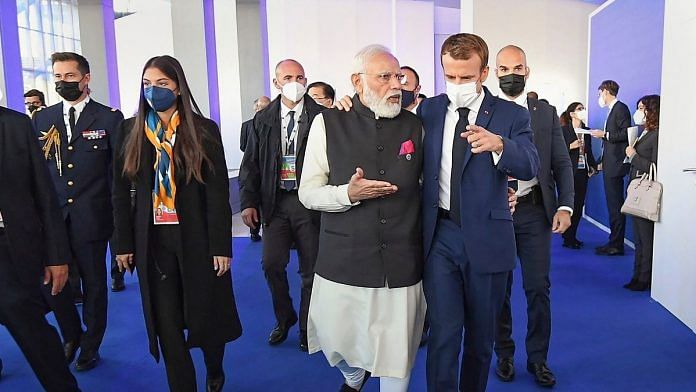Emmanuel Macron’s victory has come not because he is a popular politician able to bridge both sides of the divide, but despite a weary population grappling with mounting inflation, rising unemployment and massive immigration. All issues that Marine Le Pen succeeded in bringing to the forefront of the bruising presidential campaign.
Moreover, the hard-Left candidate, Jean-Luc Melenchon, who lost in the first round two weeks ago, refused to ask the 7.7 million people who voted for him to back Macron.
Meaning, Macron’s victory doesn’t mean France necessarily wanted him to be President, but that they wanted Marine Le Pen even less.
So, what does India think about an election playing out 8,553 km away? In the good-old days, when the Indian passport wasn’t encased in steel, you could drive from Delhi to Paris via Pakistan, Afghanistan, Turkey, Bulgaria, Bosnia, Slovenia, Austria and Belgium. Today, a Schengen visa, via France, comes with several tough conditionalities, mostly aimed at plugging loopholes that intrepid illegal migrants may make use of to jump ship.
This fear, that illegals from developing nations may overwhelm majority Catholic France, has become the new normal. Marine Le Pen has brought these concerns centre-stage and Macron hasn’t been able to allay them.
Still, the answer to who rules France is important not just for France, or the European Union, in which it is embedded, or the UN Security Council of which it is a permanent member – but also for India.
Also read: Emmanuel Macron’s win is an opportunity for France and the EU
An Indo-Pacific power
Why a reader of ThePrint should care who sits in the Elysée is simple: France has occasionally inculcated the odd habit of doing something really different and almost getting away with it. Like the ideas of liberty, egalitarianism and fraternity the French Revolution espoused 223 years ago, which the Indian Constitution embraced with such fervour in 1950. (Of course, France temporarily forgot those ideals when it pursued the colonisation of Algeria some decades ago with exemplary vigour and passion; to its credit, it has tried to wear the warts from those shameful decades on its sleeve.)
Not that France has fully relinquished her colonies. There are still a few littered across the globe – from Saint Pierre and Miquelon off the northern coast of Canada to islands in the Caribbean to French Guiana in South America to territories in the South Pacific, like New Caledonia, Wallis and Futuna and French Polynesia, which together account for one-third of the Pacific Islands’ combined exclusive economic zone.
This, along with tiny territories like Reunion, Mayotte, Tromelin and Iles Eparses in the South Indian Ocean allow France the grandiose self-perception of being called an “Indo-Pacific power.”
Still, back in 1998 when India went nuclear, France was the only major power not to have scolded Delhi. The US imposed tough sanctions, as did the UK; even Russia, India’s old friend, was quite irritated it had not been told in advance about India’s intentions. But France understood.
France is also the only other country, besides Britain, to have been invited as chief guest to India’s Republic Day celebrations, as many as five times (1976, 1980, 1998, 2008 and 2016). Soon after India got a waiver from the Nuclear Suppliers’ Group in 2008 to conduct nuclear trade, France became the only other country, besides Russia, to sign an agreement to sell nuclear reactors to India. The French have sold Scorpene submarines and Mirage fighter jets and more recently, Rafale jets – no doubt, the defence deals have sweetened the way for a better diplomatic relationship.
Leaders from both sides have used the highest praise for the other. During his visit to Delhi in January 2016, then-president Francois Hollande said he was determined to “consolidate the strategic partnership” with India; Prime Minister Narendra Modi responded by saying, “India and France are made for each other.”
Also read: Modi’s India is in a foreign policy sweet spot by playing all sides — US, China, EU, Russia
India’s ‘new Russia’
By 2019, when Modi returned as PM for the second time, the relationship was in even greater form.
During his trip to Paris in August 2019, weeks after the government revoked Article 370 in Jammu and Kashmir and put half the political class in the former state under house arrest, President Macron made no comment about the violation of human rights in the state.
In fact, at the UNSC closed-door meeting called by China in the wake of the 5 August abrogation—spurred on by Pakistan—France supported India’s stand on Kashmir.
Earlier, too, the French had backed the UNSC resolution sanctioning Pakistani terrorist Masood Azhar (one of three terrorists released in exchange for the passengers of IC-814 in Kandahar in 1999) as well as stronger FATF sanctions against Pakistan.
Soon enough, many in Delhi and Paris began to call France “India’s new Russia.”
Certainly, Macron has been an interesting president these past five years, not least because he has spent several hours conducting shuttle diplomacy with Vladimir Putin over the war in Ukraine– but at the presidential debate, accused Le Pen of being a Putin spokesman because she allegedly took a loan for her 2017 campaign via a Russian bank.
With the war in Ukraine in its second month – although US politicians Antony Blinken and Lloyd Austin were in Kyiv over this weekend – the newly elected Macron is expected to put himself at the forefront of a united European Union front against Moscow. Certainly, the coming weeks will be interesting not just for the new French president, but for the rest of the international community too.
Jyoti Malhotra is a senior consulting editor at ThePrint. She tweets @jomalhotra. Views are personal.
(Edited by Neera Majumdar)



